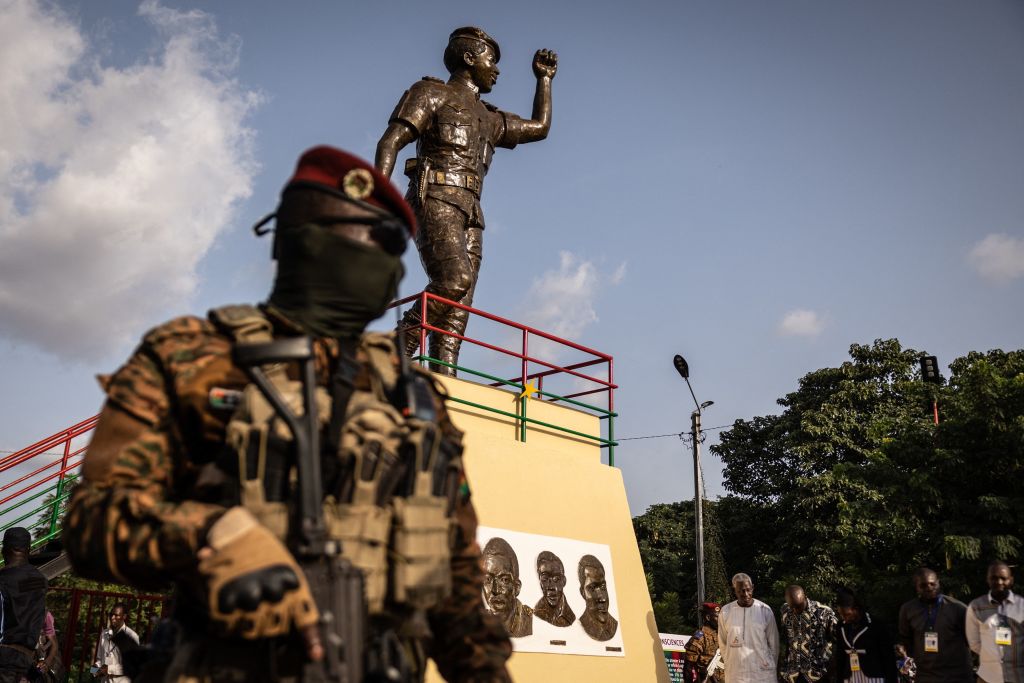ADF STAFF
As Burkina Faso tries to regain stability after the second military coup in nine months, the country is grappling with several key questions: What are the prospects for a return to civilian rule? How will the coups impact the fight against terrorism? Are more coups still to come?
The answers to these questions will define the future of the country.
Path to a New Government
Since September 30 when Army Capt. Ibrahim Traoré seized power, domestic and international voices have called for a swift return to civilian rule. The Economic Community of West African States (ECOWAS) had an agreement with the previous junta to hold elections before July 2, 2024, with the condition that coup leaders could not be candidates. Traoré said he will stick to these terms and former Nigerien President Mahamadou Issoufou, who is serving as mediator on behalf of ECOWAS, is optimistic the elections will happen.
“I can already assure you that ECOWAS will remain at the side of the Burkinabe people,” said Issoufou. “We will continue to accompany the Burkinabe people in this very difficult ordeal they are going through.”
Some believe that timeline is too long.
The Center for Democratic Governance, a Burkinabe think tank, has called for the army to cede power immediately, return to the barracks and make way for an inclusive, civilian-led transitional government. “The constitution is supreme over any other legal provision whatever the exceptional circumstances,” the center said in a document released October 12 following a working group session.
But there are signs Traoré is consolidating power. After a two-day national forum on October 14 and 15, he signed a charter giving his allies a majority of seats in the legislature and lead roles in the transitional government. On October 21, he was sworn in as head of state at a small event not attended by foreign dignitaries.
Traoré used a meeting on November 10 and 11 with leaders of the country’s former ruling party to denounce the political class for having “done everything to abandon certain people.” He scolded the crowd and said much of the country was “nearly lost” from governmental control.
“Everyone must make a mea culpa and ask themselves ‘what can I do for the homeland?’” he said.
Worsening Security
Both coup leaders have justified their power grabs as a response to insecurity. However, military rule has failed to deliver peace.
According to a report by the Africa Center for Strategic Studies, the country is on pace to record more than 1,500 violent events and 3,800 fatalities in 2022. This represents a 35% increase from the previous year.
The second military coup may have diverted resources from the front lines of the terror fight. Units deployed to the Centre-Nord region as part of a counterterror operation known as Laabingol 2 took part in the coup. Similarly, an operation planned in the west to liberate towns occupied by the extremist group Jama’at Nusrat al Islam wa al Muslimeen was suspended due to the coup, according to the research consultancy MENASTREAM.
“If rampant insecurity and the humanitarian emergency are cited as arguments (could arguably just be pretexts) for the recent coup, it should be noted that all large-scale military operations that either were ongoing or in the launch phase were suspended during the latest coup,” MENASTREAM tweeted on October 23.
Early data on the security situation under the Traoré regime is not promising. Speaking on the independent television station BF1, security expert Mahamaoudou Sawadogo said that during the first 30 days the junta held power, the country suffered three to four terror attacks per day, causing five daily deaths.
“The terrorists took advantage of the fluctuation and the fact that the military was preoccupied with establishing their power in Ouagadougou, to multiply murderous raids,” L’Economiste du Faso reported.
One initiative launched by Traoré calls for recruiting 50,000 civilians to bolster the counterterror fight. About 15,000 would serve alongside combat units and another 35,000 would be part of home-defense groups known as the Volunteers for the Defense of the Homeland, which protect rural towns from attacks, Le Monde newspaper reported. Critics have cautioned that the plan has the potential to worsen intercommunal violence.
More to Come?
History shows that coups tend to happen in cycles. Having already endured two coups, experts warn that there is little to prevent other plotters from launching another. This could become even more likely if the security situation continues to deteriorate or elections are delayed.
‘’I think that it would be very challenging for the current military junta to survive without the fear that a possible countercoup could occur,” David Otto Endeley, director of counterterrorism at the Center for African Security and Strategic Studies in Switzerland, told Voice of America. “There’s a possibility of a countercoup and, if that were the case, then there would be further instability.”

